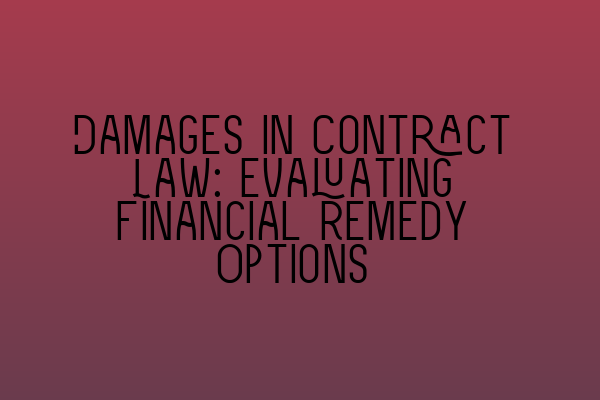As a solicitor, understanding the concept of damages in contract law is crucial when advising clients on their financial remedy options. Damages are essentially a monetary award that is granted to a party who has suffered a breach of contract. This financial remedy aims to compensate the injured party for any losses they have incurred as a result of the breach.
When evaluating financial remedy options in contract law, it is important to consider the different types of damages that can be awarded. These include compensatory damages, nominal damages, and liquidated damages.
Compensatory Damages
Compensatory damages are the most common type of damages awarded in contract law cases. The goal of compensatory damages is to put the injured party in the position they would have been in if the breach had not occurred. This means that the damages should cover any actual losses suffered as a direct result of the breach.
There are two types of compensatory damages: general damages and special damages. General damages are meant to cover losses that are not easily quantifiable, such as emotional distress or loss of reputation. Special damages, on the other hand, are awarded for tangible financial losses, such as lost profits or additional expenses incurred as a result of the breach.
Calculating compensatory damages can sometimes be complex, as it requires a thorough analysis of the specific circumstances of the breach and the losses suffered. It is crucial for solicitors to have a strong understanding of the principles and case law surrounding compensatory damages in order to provide accurate advice to their clients.
Nominal Damages
Nominal damages are often awarded when a breach of contract has occurred, but the injured party has not suffered any actual financial loss as a result. These damages are usually a small amount, such as £1, and are awarded to recognize that a breach has taken place and to uphold the principle of contract enforceability.
Nominal damages can be an important option to consider, as they send a message that breaches of contract will not be tolerated, even if no significant financial harm has been caused. It is worth noting that nominal damages may also be awarded alongside other types of damages, such as compensatory damages, depending on the circumstances of the case.
Liquidated Damages
Liquidated damages are pre-determined amounts that parties agree to in their contract as compensation in the event of a breach. These damages are often used in contracts where it would be difficult to calculate or prove the actual losses that would occur in the event of a breach.
By including liquidated damages provisions in a contract, parties can have clarity and certainty regarding the financial consequences of a breach. However, it is important to ensure that the agreed-upon amount is reasonable and not excessive, as courts may deem such provisions unenforceable or as penalties.
Solicitors must carefully review the specific clauses related to liquidated damages in their clients’ contracts to determine their enforceability and advise accordingly.
Conclusion
When evaluating financial remedy options in contract law, it is essential to consider the various types of damages that can be awarded. Compensatory damages, both general and special, aim to compensate the injured party for their actual losses. Nominal damages are awarded to recognize a breach of contract, even in the absence of significant financial harm. Liquidated damages provide certainty regarding the financial consequences of a breach, but their enforceability depends on reasonableness.
As a solicitor, having a comprehensive understanding of damages in contract law is crucial in order to provide effective advice to clients. By carefully analyzing the circumstances of the breach, the losses suffered, and the specific contract clauses, solicitors can advise clients on the most appropriate financial remedy options available to them.
To enhance your understanding of contract law and prepare for the SQE exams, check out our related articles:
